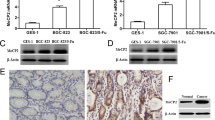Abstract
Background
Aberrant promoter methylation of tumor suppressor gene can inhibit corresponding protein expression and promote carcinogenesis. Many studies have demonstrated that human mutL homolog 1(hMLH1) promoter methylation is correlated with occurrence and progression of multiple types of tumors. However, its correlation with esophageal carcinoma drug resistance is still unknown.
Aims
To confirm methylation status of hMLH1 promoter in drug-resistance cell line of esophageal carcinoma, further confirm whether hMLH1 promoter methylation is responsible for drug resistance.
Methods
Two stable esophageal carcinoma drug-resistance cell lines were successfully established by Cisplatin (DDP) concentration increment method; methylation status of hMLH1 promoter, mRNA and protein expression of hMLH1 were detected by methylation-specific PCR (MSP), RT-PCR and western blot, respectively; Drug-resistance ability assay was used to detect drug-resistance ability.
Results
Stronger methylation status of hMLH1 promoter, lower hMLH1 mRNA and protein expression were found in both drug-resistance cell lines; after removing methylated bands using 5-aza-2′-deoxycytidine(5-Aza-CdR) in drug-resistance cell lines, hMLH1 mRNA and protein expression were restored and drug-resistance abilities declined nearly by half.
Conclusion
hMLH1 promoter hypermethylation plays important roles in esophageal carcinoma drug-resistance and show us the prospect that combination of demethylation treatment with conventional chemotherapy drugs may bring better therapy effect.


Similar content being viewed by others
References
Ling Z-Q, Li PG, Ming-Hua H et al (2011) Aberrant methylation of different DNA repair genes demonstrates distinct prognostic value for esophageal cancer. Dig Dis Sci 56(10):2992–3004
Guohong Z, Min S, Duenmei W et al (2010) Genetic heterogeneity of oesophageal cancer in high-incidence areas of southern and northern China. PLoS One 5(3):e9668
Enzinger PC, Mayer RJ (2003) Esophageal cancer. The New England journal of medicine 349(23):2241–2252
Schmutte C, Sadoff MM, Shim KSea (2001) The interaction of DNA mismatch repair proteins with human exonuclease I. J Biol Chem 276(35):33011–8
Arai TK, Sawabe I, Honma M et al (2010) Role of methylation of the hMLH1 gene promoter in the development of gastric and colorectal carcinoma in the elderly. Geriatrics Gerontol Int 10(Suppl 1):S207–S212
Kim HGL, Kim S, Ryu Y et al (2010) Aberrant methylation of DNA mismatch repair genes in elderly patients with sporadic gastric carcinoma: a comparison with younger patients. J Surg Oncol 101(1):28–35
Arai T, Kasahara I, Sawabe M et al (2010) Role of methylation of the hMLH1 gene promoter in the development of gastric and colorectal carcinoma in the elderly. Geriatrics Gerontol Int 10(Suppl 1):S207–S212
Nakagawachi TSH, Urano T, Zhao W et al (2003) Silencing effect of CpG island hypermethylation and histone modifications on O6-methylguanine-DNA methyltransferase (MGMT) gene expression in human cancer. Oncogene 22(55):8835–8844
Yan Nie JL, Zhao Xin, Song Y et al (2002) Detection of multiple gene hypermethylation in the development of esophageal squamous cell carcinoma. Caicinogenesis 123(10):1713–1720
Cheng HS, Sun N, Chen B et al (2010) Polymorphisms in hMSH2 and hMLH1 and response to platinum-based chemotherapy in advanced non-small-cell lung cancer patients. Acta Biochim Biophys Sin 42(5):311–317
Feitsma H, Akay A, Cuppen E (2008) Alkylation damage causes MMR-dependent chromosomal instability in vertebrate embryos. Nucleic Acids Res 36(12):4047–4056
Li DH, Wang F, Cui B et al (2013) Prevalence of pathological germline mutations of hMLH1 and hMSH2 genes in colorectal cancer. PLoS One 8(3):e51240
O’Brien V, Brown R (2006) Signalling cell cycle arrest and cell death through the MMR System. Carcinogenesis 27(4):682–692
YanT SJ, Hwang HS, Wagner MW et al (2001) Loss of DNA mismatch repair imparts defective cdc2 signaling and G(2) arrest responses without altering survival after ionizing radiation. Cancer Res 61(22):8290–8297
Alkam YMH, Nakai K, Himuro T et al (2013) Protein expression and methylation of DNA repair genes hMLH1, hMSH2, MGMT and BRCA1 and their correlation with clinicopathological parameters and prognosis in basal-like breast cancer. Histopathology 63(5):713–725
Jha R, Gaur P, Sharma SCDS et al (2013) Single nucleotide polymorphism in hMLH1 promoter and risk of tobacco-related oral carcinoma in high-risk Asian Indians. Gene 526(2):223–227
Su YYL, Liu R, Sheng J et al (2013) Promoter methylation status of MGMT, hMSH2, and hMLH1 and its relationship to corresponding protein expression and TP53 mutations in human esophageal squamous cell carcinoma. Med Oncol 31(2):784
Tzao CHH, Sun GH, Lai HL et al (2005) Promoter methylation of the hMLH1 gene and protein expression of human mutL homolog 1 and human mutS homolog 2 in resected esophageal squamous cell carcinoma. J Thoracic Cardiovasc Surg 130(5):1371
Nie Y, Liao J, Zhao X et al (2002) Detection of multiple gene hypermethylation in the development of esophageal squamous cell carcinoma. Carcinogenesis 23(10):1713–1720
Chik F, Machnes Z, Szyf M et al (2014) Synergistic anti-breast cancer effect of a combined treatment with the methyl donor S-adenosyl methionine and the DNA methylation inhibitor 5-aza-2′-deoxycytidine. Carcinogenesis 35(1):138–144
Author information
Authors and Affiliations
Corresponding author
Ethics declarations
Funding
This study was not funded by any grant.
Conflict of interest
Author Yang Cao declares that he has no conflict of interest. Author Yu Chen declares that he has no conflict of interest. Author Yixuan Huang declares that he has no conflict of interest. Author Zifeng Liu declares that she has no conflict of interest. Author Guixin Li declares that he has no conflict of interest.
Ethical approval
This article does not contain any studies with human participants or animals performed by any of the authors.
Additional information
Y. Cao and Y. Chen provided equal contribution to this study.
Rights and permissions
About this article
Cite this article
Cao, Y., Chen, Y., Huang, Y. et al. In vitro study of human mutL homolog 1 hypermethylation in inducing drug resistance of esophageal carcinoma. Ir J Med Sci 186, 257–263 (2017). https://doi.org/10.1007/s11845-016-1401-2
Received:
Accepted:
Published:
Issue Date:
DOI: https://doi.org/10.1007/s11845-016-1401-2




